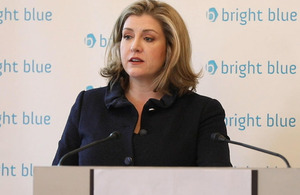Mordaunt launches fund to help isolated and marginalised women return to work
Victims of domestic abuse, homelessness or substance abuse, will be supported to return to work by a new government fund, launched today (7 Feb) by the Minister for Women and Equalities Penny Mordaunt.

- £500,000 will help start up innovative programmes to help marginalised women return to work
- Around 1.8 million women are currently economically inactive because they are caring for their home or family - more than eight times the number of men in that position
- The new fund opens today for organisations and charities across England.
In the UK, around 1.8 million women are currently economically inactive because they are caring for their home or family, this is more than eight times the number of men in that position. Nine out of 10 potential returners to work are women.
The new £500,000 fund, which opens today for organisations around England, follows Ms Mordaunt’s commitment to put marginalised women at the heart of the Government Equalities Office’s (GEO) work, and to publish a strategy in late spring setting out how government will work to economically empower all women.
Grants will only go to those organisations which can show they have direct relationships with employers who can offer jobs opportunities. They will support parents and carers - men and women - back into the workplace through training, refreshing skills and facilitating work placements.
The funding will support vulnerable people who struggle to return to work, such as:
- Victims of domestic abuse, including economic abuse
- People who are homeless or at risk of homelessness
- People who speak little to no English
- People with substance abuse support needs
- People with mental or physical health issues
- People who can’t access public funds due to their immigration status, but who have the right to work
- Ex-offenders
- People struggling to cope with their economic circumstances
- Women who experience multiple barriers due to their gender and their faith, sexual orientation and/or gender identity.
Minister for Women and Equalities Penny Mordaunt said:
“For too long caring responsibilities, language barriers or the terrible impacts of domestic abuse have held many women back from having the freedom, support and choice to do what they want to do.
“I want all these women to be given the chance to reach their full potential, which is why we are investing in them to grow their skills and their confidence, so they feel ready to return to work when they want to.
“By supporting women at all stages of their lives, we are tapping into previously ignored talent, addressing gender inequality in the workplace and helping our economy grow.”
Work and Pensions Secretary Amber Rudd said:
“I welcome the steps set out today and encourage all employers to open their doors to the huge pool of talent out there.
“Last year was a record breaking year for women’s employment with more in work than ever before.
“But for some women, economic empowerment remains the final frontier. Women can never be truly free until they have economic independence and I know there are still women out there who need extra support to help them overcome their personal barriers and find their way into a job they want.”
Studies have shown that time out of work and fewer years of full-time work are two of the reasons women struggle. Analysis by the Institute for Fiscal Studies found that time out of the labour market has a substantial impact of women’s salaries. On returning to work, women earn around 2% less on average for every year spent out of paid work.
Last year the government guaranteed £1.5 million to get people with caring responsibilities back into work. So far, £489,050 has already been awarded to five organisations, and the remaining £1.01m will be awarded soon.
To ensure the GEO is at the heart of the government’s work on equalities, last year Ms Mordaunt announced it will join Cabinet Office from 1 April. GEO will work across government and with business and civil society to tackle persistent inequalities that limit economic empowerment at every stage of life.
Notes to editors:
Information on the grant can be found here